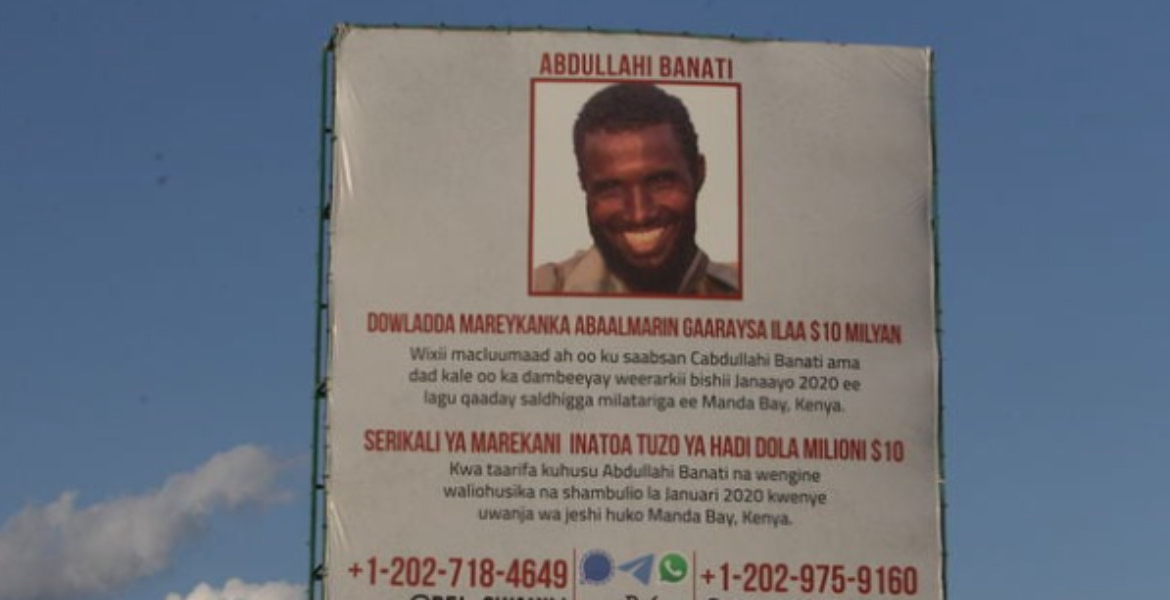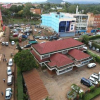US Offers Sh1.3 Billion Bounty for al-Shabaab Operative in Garissa

A contentious billboard offering a staggering Sh1.3 billion ($10 million USD) reward for information leading to the capture of Abdullahi Banati, a high-ranking operative within the al-Shabaab militant group, has ignited a fierce debate in Garissa town.
The billboard, erected at a key entry point to the North Eastern Kenyan town, is part of the US State Department's Rewards for Justice (RFJ) program and aims to disrupt extremist operations by targeting a figure implicated in multiple high-profile terror attacks. The immediate effect of the billboard's unveiling has been a surge in public discourse, characterised by deeply divided opinions. Some residents and security analysts view the bounty as a necessary and potentially effective tool in the ongoing fight against terrorism, while others, particularly within the Garissa community, perceive it as a harmful measure that unfairly stigmatises the region and perpetuates negative stereotypes.
Abdullahi Banati's notoriety stems from his alleged involvement in several devastating attacks, most notably the 2019 Dusit D2 complex bombing in Nairobi and the 2013 Westgate Mall siege. More recently, he is believed to have played a key role in the 2020 assault on Camp Simba in Manda Bay, Lamu County, where al-Shabaab operatives attacked a Kenya-US military facility, resulting in the deaths of three American personnel and injuries to a Kenyan soldier, as well as tens of millions of dollars in damages to military infrastructure. Banati’s operational role in al-Shabaab’s Jaysh Ayman unit, known for its cross-border attacks in Kenya, has made him a high-priority target for both Kenyan and international security agencies.
For many Garissa residents, the billboard's presence is deeply troubling, as it reinforces the perception that the region is a breeding ground for terrorism. Hassan Adan, a local businessman, expresses his frustration, stating, "This just reinforces the idea that Garissa is a hub for terrorists. It does little to assure us of safety and instead paints our home in a bad light."
The effectiveness of a bounty-based approach to counterterrorism is also being questioned. Halima Hathi, another resident, voices concerns about the strategy's efficacy, suggesting that conventional intelligence and security operations would be more appropriate. “We already have intelligence agencies. If Banati is indeed here, why not use proper security operations instead of plastering a billboard that stigmatises our town?” she asks.
Security officials, however, remain steadfast in their defence of the tactic. Speaking anonymously, one senior security official highlights the historical success of financial incentives in generating crucial tips from civilians, especially in remote areas where terrorists seek refuge. "It might seem controversial, but at the end of the day, we need information to get results," he explains. "With such a massive bounty, someone will eventually speak up."
Concerns about potential repercussions for informants, stemming from past allegations of police brutality and indiscriminate security operations in North Eastern Kenya, further complicate the situation. John Mwasya, a boda boda rider, expresses his reluctance to cooperate, stating, "If I knew anything, I wouldn’t say a word. The same security forces would turn around and interrogate me about how I knew what they didn’t.”
Regional Commissioner John Otieno has sought to reassure residents, emphasising the government's commitment to maintaining security in Garissa and surrounding areas. Al-Shabaab, designated as a Foreign Terrorist Organisation by the US in 2008, continues to pose a serious threat to Kenya, Somalia, and neighbouring nations. The group's ability to carry out large-scale attacks underscores the persistent challenge of containing violent extremism.
The US military conducted a thorough review of security protocols at its installations in Africa, identifying weaknesses that had made the Manda Bay facility vulnerable and consequently introducing new defence measures to fortify military bases, enhance intelligence-sharing, and improve crisis response strategies.
The Kenyan Defence Forces (KDF), which played a critical role in defending Camp Simba during the 2020 attack, have since strengthened counterterrorism operations. The bravery of Kenyan soldiers was later recognised through commendations by US military officials.
This latest bounty is reminiscent of a similar offer made by the US government in 2023 for another high-ranking al-Shabaab leader, Maalim Ayman, believed to have orchestrated the Manda Bay raid, who remains at large. The US government has provided secure tip-off channels, including WhatsApp and Signal, ensuring confidentiality for those willing to share intelligence.








Add new comment